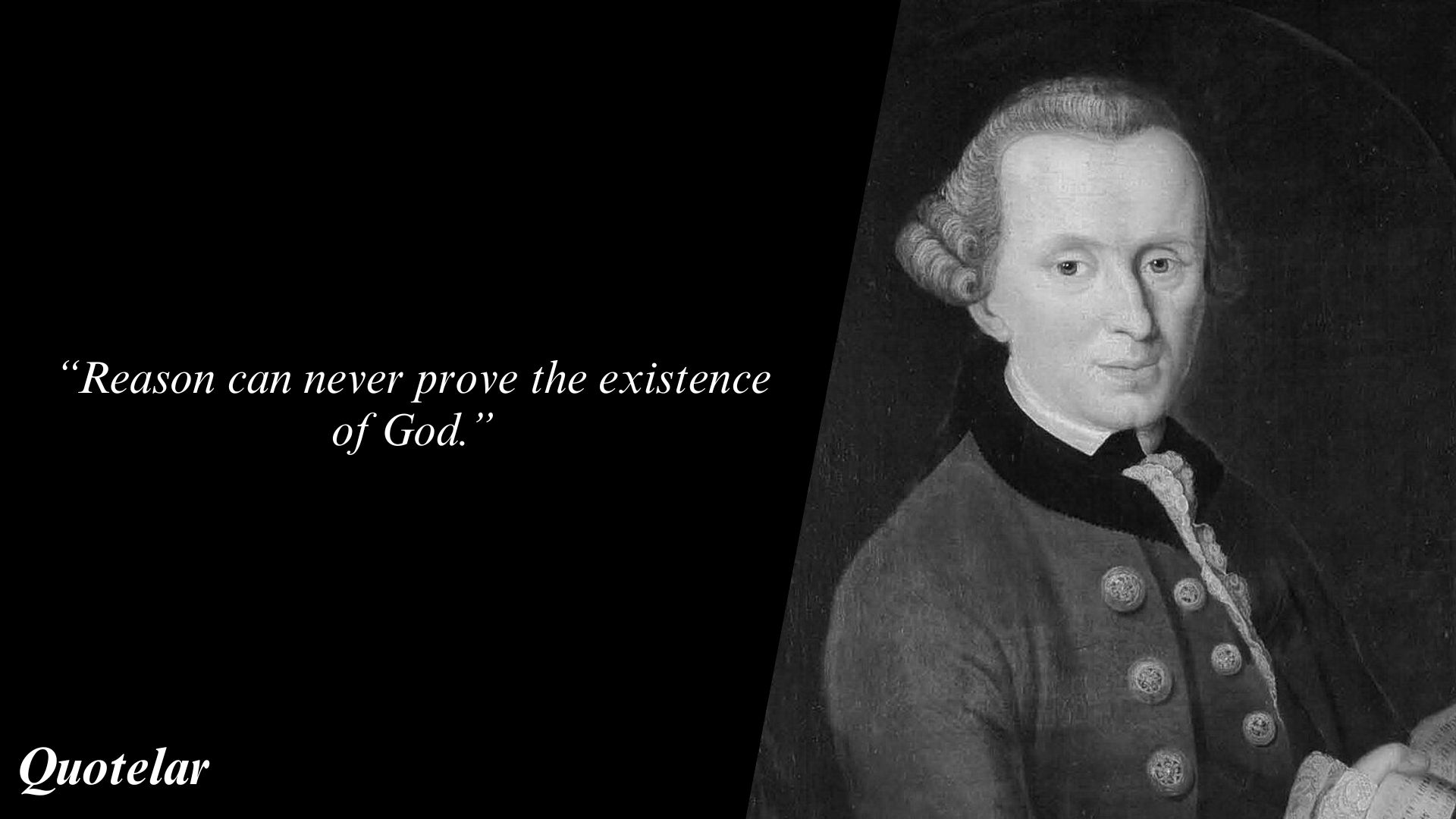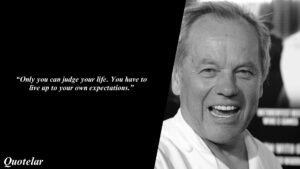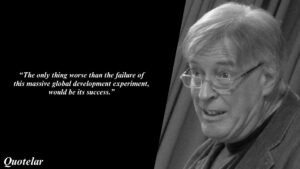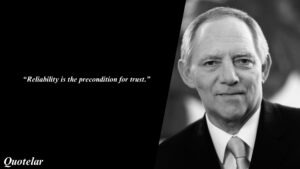
Immanuel Kant (1724-1804) was a German philosopher known for his influential contributions to metaphysics, epistemology, and ethics. In his seminal work, “Critique of Pure Reason,” Kant explored the limits of human knowledge, distinguishing between a priori and a posteriori knowledge. He introduced the categorical imperative in ethics, emphasizing universalizable maxims as the basis for moral actions. Kant’s metaphysical stance, known as transcendental idealism, posited that reality is shaped by the mind’s cognitive faculties. In “Critique of Judgment,” he examined aesthetic judgments and teleology in nature. Additionally, Kant made contributions to political philosophy, proposing ideas for perpetual peace among nations. His ideas have left a lasting impact, shaping discussions in philosophy, ethics, and political theory, with an enduring emphasis on individual autonomy and the primacy of reason.
Immanuel Kant Quotes
1. “Do the right thing because it is right.”
— Immanuel Kant
2. “Rules for Happiness: something to do, someone to love, something to hope for.”
— Immanuel Kant
3. “Science is organized knowledge. Wisdom is organized life.”
— Immanuel Kant
4. “Two things awe me most, the starry sky above me and the moral law within me.”
— Immanuel Kant
5. “If the truth shall kill them, let them die.”
— Immanuel Kant
6. “Patience is the strength of the weak, impatience is the weakness of the strong.”
— Immanuel Kant
7. “Live your life as though your every act were to become a universal law.”
— Immanuel Kant
8. “You only know me as you see me, not as I actually am.”
— Immanuel Kant
9. “Morality is not the doctrine of how we may make ourselves happy, but how we may make ourselves worthy of happiness.”
— Immanuel Kant
10. “Always treat people as ends in themselves, never as means to an end.”
— Immanuel Kant
11. “The wise man can change his mind; the stubborn one, never.”
— Immanuel Kant
12. “Dare to think!”
— Immanuel Kant
13. “We can judge the heart of a man by his treatment of animals.”
— Immanuel Kant
14. “The death of dogma is the birth of morality.”
— Immanuel Kant
15. “Experience without theory is blind, but theory without experience is mere intellectual play.”
— Immanuel Kant
16. “Beneficence is a duty.”
— Immanuel Kant
17. “Thoughts without content are empty, intuitions without concepts are blind.”
— Immanuel Kant
18. “But a lie is a lie, and in itself intrinsically evil, whether it be told with good or bad intents.”
— Immanuel Kant
19. “There is nothing higher than reason.”
— Immanuel Kant
20. “Space and time are the framework within which the mind is constrained to construct its experience of reality.”
— Immanuel Kant
21. “Enlightenment is man’s emergence from his self-incurred immaturity.”
— Immanuel Kant
22. “Whereas the beautiful is limited, the sublime is limitless, so that the mind in the presence of the sublime, attempting to imagine what it cannot, has pain in the failure but pleasure in contemplating the immensity of the attempt.”
— Immanuel Kant
23. “All perception is colored by emotion.”
— Immanuel Kant
24. “Great minds think for themselves.”
— Immanuel Kant
25. “In law a man is guilty when he violates the rights of others. In ethics he is guilty if he only thinks of doing so.”
— Immanuel Kant
26. “Reason can never prove the existence of God.”
— Immanuel Kant
27. “A single line in the Bible has consoled me more than all the books I ever read besides.”
— Immanuel Kant
28. “If justice perishes, human life on Earth has lost its meaning.”
— Immanuel Kant
29. “Two things fill the mind with ever new and increasing admiration and awe, the oftener and more steadily we reflect on them: the starry heavens above and the moral law within.”
— Immanuel Kant
30. “Three things tell a man: his eyes, his friends and his favorite quotes.”
— Immanuel Kant
31. “Nature, when left to universal laws, tends to produce regularity out of chaos.”
— Immanuel Kant
32. “The human heart refuses to believe in a universe without a purpose.”
— Immanuel Kant
33. “Perpetual Peace is only found in the graveyard.”
— Immanuel Kant
34. “It is never too late to become reasonable and wise.”
— Immanuel Kant
35. “The only thing that is good without qualification is a good will.”
— Immanuel Kant
36. “An action is essentially good if the motive of the agent be good, regardless of the consequences.”
— Immanuel Kant
37. “Act in such a way that you treat humanity, whether in your own person or in the person of any other, never merely as a means to an end, but always at the same time as an end.”
— Immanuel Kant
38. “Give a man everything he wants and at that moment everything is not everything.”
— Immanuel Kant
39. “Do what is right, though the world may perish.”
— Immanuel Kant
40. “Ingratitude is the essence of vileness.”
— Immanuel Kant
41. “Man’s duty is to improve himself; to cultivate his mind; and, when he finds himself going astray, to bring the moral law to bear upon himself.”
— Immanuel Kant
42. “Act so that the maxim of your act could be made the principle of a universal law.”
— Immanuel Kant
43. “If man makes himself a worm he must not complain when he is trodden on.”
— Immanuel Kant
44. “The business of philosophy is not to give rules, but to analyze the private judgments of common reason.”
— Immanuel Kant
45. “If we knew that god exists, such knowledge would make morality impossible. For, if we acted morally from fear or fright, or confident of a reward, then this would not be moral. It would be enlightened selfishness.”
— Immanuel Kant
46. “There can be no doubt that all our knowledge begins with experience.”
— Immanuel Kant
47. “Art is purposiveness without purpose.”
— Immanuel Kant
48. “Out of the crooked timber of humanity, no straight thing was ever made.”
— Immanuel Kant
49. “For peace to reign on Earth, humans must evolve into new beings who have learned to see the whole first.”
— Immanuel Kant
50. “Heaven has given human beings three things to balance the odds of life: hope, sleep, and laughter.”
— Immanuel Kant
51. “Act only according to that maxim whereby you can at the same time will that it should become a universal law.”
— Immanuel Kant
52. “I had therefore to remove knowledge, in order to make room for belief.”
— Immanuel Kant
53. “Imagination is a powerful agent for creating, as it were, a second nature out of the material supplied to it by actual nature.”
— Immanuel Kant
54. “Philosophy stands in need of a science which shall determine the possibility, principles, and extent of human knowledge à priori.”
— Immanuel Kant
55. “The greatest human quest is to know what one must do in order to become a human being.”
— Immanuel Kant
56. “With men, the state of nature is not a state of peace, but war.”
— Immanuel Kant
57. “Beauty presents an indeterminate concept of Understanding, the sublime an indeterminate concept of Reason.”
— Immanuel Kant
58. “One is not rich by what one owns, but more by what one is able to do without with dignity.”
— Immanuel Kant
59. “The nice thing about living in a small town is that when you don’t know what you’re doing, someone else does.”
— Immanuel Kant
60. “Freedom is that faculty that enlarges the usefulness of all other faculties.”
— Immanuel Kant
61. “It is through education that all the good in the world arises.”
— Immanuel Kant
62. “Have patience awhile; slanders are not long-lived. Truth is the child of time; erelong she shall appear to vindicate thee.”
— Immanuel Kant
63. “Only the descent into the hell of self-knowledge can pave the way to godliness.”
— Immanuel Kant
64. “What can I know? What ought I to do? What can I hope?”
— Immanuel Kant
65. “Humanity is at its greatest perfection in the race of the whites.”
— Immanuel Kant
66. “Habe den Mut, dich deines eigenen Verstandes zu bedienen.”
— Immanuel Kant
67. “Thoughts without content are empty, intuitions without concepts are blind… The understanding can intuit nothing, the senses can think nothing. Only through their union can knowledge arise.”
— Immanuel Kant
68. “Act that your principle of action might safely be made a law for the whole world.”
— Immanuel Kant
69. “The sum total of all possible knowledge of God is not possible for a human being, not even through a true revelation. But it is one of the worthiest inquiries to see how far our reason can go in the knowledge of God.”
— Immanuel Kant
70. “A categorical imperative would be one which represented an action as objectively necessary in itself, without reference to any other purpose.”
— Immanuel Kant
71. “Feminine traits are called weaknesses. People joke about them; fools ridicule them; but reasonable persons see very well that those traits are just the tools for the management of men, and for the use of men for female designs.”
— Immanuel Kant
72. “Animals… are there merely as a means to an end. That end is man.”
— Immanuel Kant
73. “Procrastination is hardly more evil than grasping impatience.”
— Immanuel Kant
74. “All our knowledge falls with the bounds of experience.”
— Immanuel Kant
75. “God, freedom, and immortality are untenable in the light of pure reason.”
— Immanuel Kant
76. “After death the soul possesses self-consciousness, otherwise, it would be the subject of spiritual death, which has already been disproved. With this self-consciousness necessarily remains personality and the consciousness of personal identity.”
— Immanuel Kant
77. “Freedom is the alone unoriginated birthright of man, and belongs to him by force of his humanity; and is independence on the will and co-action of every other in so far as this consists with every other person’s freedom.”
— Immanuel Kant
78. “Suicide is not abominable because God prohibits it; God prohibits it because it is abominable.”
— Immanuel Kant
79. “God put a secret art into the forces of Nature so as to enable it to fashion itself out of chaos into a perfect world system.”
— Immanuel Kant
80. “Time is not an empirical concept. For neither co-existence nor succession would be perceived by us, if the representation of time did not exist as a foundation a priori.”
— Immanuel Kant
81. “Ours is an age of criticism, to which everything must be subjected.”
— Immanuel Kant
82. “Aristotle can be regarded as the father of logic. But his logic is too scholastic, full of subtleties, and fundamentally has not been of much value to the human understanding. It is a dialectic and an organon for the art of disputation.”
— Immanuel Kant
83. “The hand is the visible part of the brain.”
— Immanuel Kant
84. “Always recognize that human individuals are ends, and do not use them as means to your end.”
— Immanuel Kant
85. “Give me matter, and I will construct a world out of it!”
— Immanuel Kant
86. “Maximum individuality within maximum community.”
— Immanuel Kant
87. “A society that is not willing to demand a life of somebody who has taken somebody else’s life is simply immoral.”
— Immanuel Kant
88. “All our knowledge begins with the senses, proceeds then to the understanding, and ends with reason. There is nothing higher than reason.”
— Immanuel Kant
89. “Two things strike me dumb: the infinite starry heavens, and the sense of right and wrong in man.”
— Immanuel Kant
90. “In every department of physical science there is only so much science, properly so-called, as there is mathematics.”
— Immanuel Kant
91. “Without man and his potential for moral progress, the whole of reality would be a mere wilderness, a thing in vain, and have no final purpose.”
— Immanuel Kant
92. “Maturity is having the courage to use one’s own intelligence.”
— Immanuel Kant
93. “The existence of the Bible, as a book for the people, is the greatest benefit which the human race has ever experienced. Every attempt to belittle it is a crime against humanity.”
— Immanuel Kant
94. “Every man is to be respected as an absolute end in himself; and it is a crime against the dignity that belongs to him as a human being, to use him as a mere means for some external purpose.”
— Immanuel Kant
95. “Better the whole people perish than that injustice be done.”
— Immanuel Kant
96. “Man must be disciplined, for he is by nature raw and wild.”
— Immanuel Kant
97. “The science of mathematics presents the most brilliant example of how pure reason may successfully enlarge its domain without the aid of experience.”
— Immanuel Kant
98. “Human reason is by nature architectonic.”
— Immanuel Kant
99. “Look closely. The beautiful may be small.”
— Immanuel Kant
100. “Happiness is not an ideal of reason, but of imagination.”
— Immanuel Kant
101. “Sincerity is the indispensable ground of all conscientiousness, and by consequence of all heartfelt religion.”
— Immanuel Kant
102. “All natural capacities of a creature are destined to evolve completely to their natural end.”
— Immanuel Kant
103. “Two things fill the mind with ever new and increasing admiration and awe…”
— Immanuel Kant
104. “When a thoughtful human being has overcome incentives to vice and is aware of having done his bitter duty, he finds himself in a state that could be called happiness, a state of contentment and peace of mind in which virtue is its own reward.”
— Immanuel Kant
105. “Fallacious and misleading arguments are most easily detected if set out in correct syllogistic form.”
— Immanuel Kant
106. “Ich kann, weil ich will, was ich muss.”
— Immanuel Kant
107. “An action, to have moral worth, must be done from duty.”
— Immanuel Kant
108. “We assume a common sense as the necessary condition of the universal communicability of our knowledge, which is presupposed in every logic and every principle of knowledge that is not one of skepticism.”
— Immanuel Kant
109. “Our intellect does not draw its laws from nature, but it imposes its laws upon nature.”
— Immanuel Kant
110. “Man desired concord, but nature knows better what is good for his species; she desires discord. Man wants to live easy and content; but nature compels him to leave ease… and throw himself into roils and labors.”
— Immanuel Kant
111. “Arrogance is, as it were, a solicitation on the part of one seeking honor for followers, whom he thinks he is entitled to treat with contempt.”
— Immanuel Kant
112. “We ourselves introduce that order and regularity in the appearance which we entitle “nature”. We could never find them in appearances had we, not ourselves, by the nature of our own mind, originally set them there.”
— Immanuel Kant
113. “Art does not want the representation of a beautiful thing, but the representation of something beautiful.”
— Immanuel Kant
114. “Freedom in the practical sense is the independence of the power of choice from necessitation by impulses of sensibility.”
— Immanuel Kant
115. “Genius is the ability to independently arrive at and understand concepts that would normally have to be taught by another person.”
— Immanuel Kant
116. “Life is the faculty of spontaneous activity, the awareness that we have powers.”
— Immanuel Kant
117. “Aus so krummen Holze, als woraus der Mensch gemacht ist, kann nichts ganz Gerades gezimmert werden. Out of the crooked timber of humanity, no straight thing can ever be made.”
— Immanuel Kant
118. “Everything in nature acts in conformity with law.”
— Immanuel Kant
119. “One who makes himself a worm cannot complain afterwards if people step on him.”
— Immanuel Kant
120. “The question is not so much whether there is life on Mars as whether it will continue to be possible to live on Earth.”
— Immanuel Kant
121. “It is often necessary to make a decision on the basis of knowledge sufficient for action but insufficient to satisfy the intellect.”
— Immanuel Kant
122. “So act that anything you do may become universal law.”
— Immanuel Kant
123. “Have the courage to use your own reason- That is the motto of enlightenment.”
— Immanuel Kant
124. “The existence of the Bible is the greatest blessing which humanity ever experienced.”
— Immanuel Kant
125. “It is not God’s will merely that we should be happy, but that we should make ourselves happy.”
— Immanuel Kant
126. “At some future day it will be proved, I cannot say when and where, that the human soul is, while in earth life, already in an uninterrupted communication with those living in another world.”
— Immanuel Kant
127. “Each according to his own way of seeing things, seek one goal, that is gratification.”
— Immanuel Kant
128. “In the natural state no concept of God can arise, and the false one which one makes for himself is harmful. Hence the theory of natural religion can be true only where there is no science; therefore it cannot bind all men together.”
— Immanuel Kant
129. “Reason should investigate its own parameters before declaring its omniscience.”
— Immanuel Kant
130. “Among all nations, through the darkest polytheism glimmer some faint sparks of monotheism.”
— Immanuel Kant
131. “Physicians think they do a lot for a patient when they give his disease a name.”
— Immanuel Kant
132. “Metaphysics is a dark ocean without shores or lighthouse, strewn with many a philosophic wreck.”
— Immanuel Kant
133. “Beneficence is a duty; and he who frequently practices it, and sees his benevolent intentions realized comes, at length, really to love him to whom he has done good.”
— Immanuel Kant
134. “Freedom is the opposite of necessity.”
— Immanuel Kant
135. “Nature even in chaos cannot proceed otherwise than regularly and according to order.”
— Immanuel Kant
136. “Seek not the favor of the multitude; it is seldom got by honest and lawful means. But seek the testimony of few; and number not voices, but weigh them.”
— Immanuel Kant
137. “Act so as to use humanity, yourself and others, always as an end and never as a means to an end.”
— Immanuel Kant
138. “I am an investigator by inclination. I feel a great thirst for knowledge.”
— Immanuel Kant
139. “Honesty is better than any policy.”
— Immanuel Kant
140. “It is by his activities and not by enjoyment that man feels he is alive. In idleness we not only feel that life is fleeting, but we also feel lifeless.”
— Immanuel Kant
141. “A lie is the abandonment and, as it were, the annihilation of the dignity by man.”
— Immanuel Kant
142. “The ideal of the supreme being is nothing but a regulative principle of reason which directs us to look upon all connection in the world as if it originated from an all-sufficient necessary cause.”
— Immanuel Kant
143. “Handle nur nach derjenigen Maxime, durch die du zugleich wollen kannst, dass sie ein allgemeines Gesetz werde.”
— Immanuel Kant
144. “The busier we are, the more acutely we feel that we live, the more conscious we are of life.”
— Immanuel Kant
145. “The light dove, cleaving the air in her free flight, and feeling its resistance, might imagine that its flight would be still easier in empty space.”
— Immanuel Kant
146. “Human freedom is realised in the adoption of humanity as an end in itself, for the one thing that no-one can be compelled to do by another is to adopt a particular end. – ’Metaphysical Principles of Virtue.”
— Immanuel Kant
147. “Religion is too important a matter to its devotees to be a subject of ridicule. If they indulge in absurdities, they are to be pitied rather than ridiculed.”
— Immanuel Kant
148. “Freedom is the independence of the compulsory will of another, and in so far as it tends to exist with the freedom of all according to a universal law, it is the one sole original inborn right belonging to every man in virtue of his humanity.”
— Immanuel Kant
149. “Religion is the recognition of all our duties as divine commands.”
— Immanuel Kant
150. “From such crooked wood as that which man is made of, nothing straight can be fashioned.”
— Immanuel Kant


